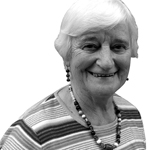On the pilgrim way: ‘Thank God for long-lasting friendship’ - Reform Magazine
Sheila Maxey gives thanks for long-lasting friendship

Long-lasting friendship is a great blessing. I have coffee nearly every week with a friend I met 50 years ago through our children. We talk about the books we are reading, our ailments and their treatment, the news and our families. We share worries, good news and disappointments. Very often, my friend tells funny stories about our children’s childhood – usually ones I no longer remember. We used to camp together, go to exhibitions on Pompeii or Tutankhamun, or go on a fungus or fossil hunt. My friend is an expert in all these fields. Today, she makes her way very slowly to the door.
There is an added blessing if that friend is also family. I have a favourite German cousin. Since I was 17 and he 20, the friendship has grown: at first occasional visits, then letters and phone calls, and nowadays, regular emails. In March, he flew over for a short visit. He wanted to meet some of the younger generation about whom I write in my emails. So, over two days, the younger people came for coffee, or supper, or lunch, and he tried to understand their terribly fast, idiomatic English. He watched their faces, listened to their tone of voice and, afterwards, felt he really knew something about them.
The young people questioned him closely because they have long admired his lifelong commitments to making the world a better place. The housing cooperative that he and his wife founded is still a small act of resistance to the unjust housing market. He recently researched the lives of Jewish doctors in the 1930s in his city, and what happened to them. His history workshop mounted an exhibition about them in the town hall.
After the visitors had gone, we talked over the same ground as with my old Brentwood friend, but I think because he is family, it was at greater depth. We talked about how we were approaching the limitations of old age. We could not avoid Brexit, as he is very interested in politics. We shared our dismay at the shameful UK chaos. And we talked about our families, going back over the decades to consider similarities of temperament and the causes of difficulties.
In due course, we were ready to share regrets – things we felt we had mishandled, children we had not treated as well as we might. And, in my cousin’s case, sadness that after all his efforts, the world seemed actually a worse place. We could not offer each other absolution or consolation, but a loving, listening ear.
We walked to the woodland bench in memory of my parents, whom my cousin had greatly admired. (He found his own parents wanting.) My husband went on his mobility scooter, and my cousin had to keep stopping for rest and to ease his painful back. We sat on the bench holding hands across the lettering: ‘In memory of Hugh and Ege Fraser.’ My old friend is an agnostic and my cousin a Marxist, but I thank God for these companions on the pilgrim way.
Sheila Maxey is Book Reviews Editor for Reform
___
This article was published in the May 2019 edition of Reform















Submit a Comment